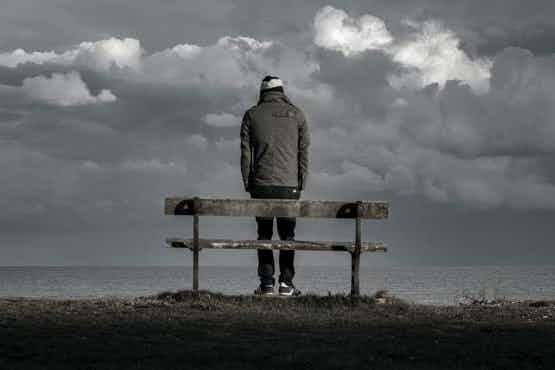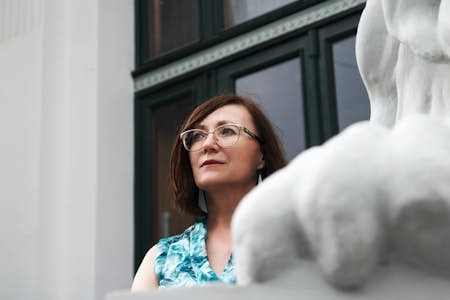Social isolation occurs when people have little social contact. It’s about the number of relationships people have rather than the quality. Although certain people are more at risk of social isolation, it can affect anyone.
Is social isolation the same as loneliness?
In short, no. Loneliness is the feeling you get when you’re unhappy with the quality of your relationships. You might have a lot of friends but still feel lonely. On the other hand, you might spend much of your time alone and be perfectly happy. It depends on the person.
Social isolation describes a lack of social contacts, not the feelings associated with it. Usually, the term doesn’t refer to the quality of relationships, either. So, while the ideas are linked, they’re not the same.
Another term we often use is solitude. According to the dictionary, solitude means "the situation of being alone without other people." We can use it in situations where we feel positively or negatively about being alone. Psychology Today describes solitude as something you choose, often associated with peacefulness.
What causes social isolation?
Anyone can experience social isolation for many reasons, but certain people are at a higher risk. This includes people with few social ties, those who live alone, experience discrimination, deal with mental health issues, or have lost people close to them.
We often assume older people must be lonely or isolated. But as recent research authors point out, ageing itself doesn’t cause social isolation or loneliness. It’s factors that are more likely to affect older adults that put them at an increased risk. For example:
- Living alone
- Being retired
- Losing family or friends
- Chronic illnesses
- Sensory losses
Lu from A Life Of Lovely also highlighted the effect of agoraphobia as a contributing factor to social isolation, telling Health Times: "I lived with agoraphobia for many years and it's really hard. It feels like you're watching your life from the inside whilst everyone else is having fun."
Social isolation in the elderly
Although ageing itself doesn’t cause social isolation and loneliness, it can be a problem for older people. Age UK says 225,000 older people often go an entire week without speaking to anyone. In an ageing and growing population, the Red Cross predicts an increase in the number of people experiencing loneliness over the next few years.
It seems our beliefs about ageing can affect our experiences, too. In 2014, a group of researchers studied whether expectations of loneliness matched feelings of loneliness in later life. They found that participants who expected they would feel lonely did so eight years later. Researchers concluded that stereotypes might affect how we feel as we age.
Cadbury’s loneliness campaign with Age UK
In March 2021, Cadbury launched a new campaign in collaboration with Age UK to combat loneliness. Instead of the usual branding, the iconic purple Dairy Milk bars will feature snippets of stories from six people aged 79 to 90.
Phrases such as “I wrestled a prime minister’s bodyguards” and “my family and I ran off to the circus” aim to raise awareness and get people chatting with elderly friends, family, and neighbours.
Cadbury will distribute ten million limited edition bars and reportedly donate £150,000 from its profits to Age UK.
Cadbury also launched a similar campaign in 2019, again in partnership with Age UK. Back then, the packaging was left almost blank, encouraging people to Donate Your Words to make a difference to older people. 30p from every bar sold went to charity.
How to overcome social isolation and loneliness
Social isolation can cause us to feel lonely. While it’s normal to feel lonely sometimes, it can also make us very unhappy. If you or someone you know is experiencing social isolation and/or loneliness, there are ways to get help.
1. Talking about how you feel
Talking about how you're feeling is an excellent place to start. Let's Talk Loneliness is a UK campaign that invites people to start conversations about loneliness using #LetsTalkLoneliness. They also provide advice and support.
Your GP can also point you in the direction of groups and services that help alleviate feelings of loneliness and isolation. In recent years, NHS England launched a social prescribing scheme. The idea is for healthcare professionals to refer people to non-clinical groups, like activities and support networks that will help them locally.
Many charities can help lessen social isolation, too. The charity Mind has published a long list of valuable contacts, including many other charities and organisations.
2. Meet people
If you’re feeling socially isolated, it makes sense to go out and meet new people! This might feel a little daunting, especially if you haven’t needed to make new friends in a while.
One way to get started is to join a local activity group or class that you find interesting. This will help you meet like-minded people and take the pressure off socialising. If you decide to take up a new activity, look at our hobby pages for inspiration.
You could also consider volunteering locally. Helping out in your community will benefit you and your local area, building skills and making new connections along the way.
3. Try group activities and befriending schemes
Many local and national groups have set up schemes to combat loneliness and social isolation. These vary depending on the area, so it’s a good idea to research what’s available close to you.
Age UK hosts a range of social activities, lunch clubs, day centres, and phone friendships around the UK. To find out more, visit their website.
4. Be kind to yourself
Feeling lonely can have a significant impact on our lives. But we feel even more down when we’re not looking after ourselves properly. Things like getting enough sleep, getting exercise, and eating well can help us start to feel better when we’re low.
It's also easy to start comparing ourselves to other people. What we see on social media or when we speak with people for a few minutes isn't necessarily how they feel most of the time. It's perfectly okay to feel lonely, and you're not alone in feeling that way!
The effects of extreme social isolation
To examine the effects of social isolation, BBC Future reported on the story of Neil Ansell. In the 1980s, he lived in a squat in London when he was offered a cottage in the remote Welsh mountains for only £100 a year.
The scenery was incredible, but the farm he lived on had only a single elderly tenant and was 10 miles from the nearest village. He didn't have a phone, and it became customary for him not to speak for two weeks at a time.
Ansell said that his identity began to slip slowly away. He explained that you start to lose a sense of who you are without people to reflect an image of yourself back to you.
He also found that adapting to a social setting was a shock to the system when he returned. Many of us have had similar feelings when Covid-19 lockdowns have ended. It feels as though we haven’t practised our social skills in a while, and we’ve become used to an emptier world.
Mental health and social isolation
Many studies focus on feelings of loneliness rather than experiences of social isolation. But the ideas are linked. Many socially isolated people will also experience loneliness.
As the charity Mind explains, loneliness isn’t a mental health problem, but mental health and loneliness are connected. When we feel lonely, it can have an impact on our mental health. Research has linked loneliness to an increased risk of depression, anxiety, and stress.
The Red Cross released a report on loneliness in 2020. Two in five people reported that loneliness was harming their mental health. One anonymous participant said:
“I want to get out, and then when I’m out I feel anxious. It makes me feel lonelier because I can see people out with other people enjoying themselves.”
If you feel loneliness is affecting your mental health, there are ways to get help. The NHS website has many resources, including a mood test, help guides, and relevant contact details.
The cost of disconnected communities
Although social isolation feels like an individual, personal problem, it can affect whole communities.
“The disconnect between people in the community, between generations and groups, and the increasing anxiety about crime has resulted in us becoming a very fragmented community and an anxious place,” Christina Ashworth, founder of Treehouse Liverpool, told The Guardian. Treehouse Liverpool delivers local projects based on community wellbeing.
Disconnected communities could be costing the UK economy £32 billion every year. Research commissioned by the Eden Project shows this figure comes from barriers including health services, policing, and productivity losses.
Finding a solution to disconnected communities might be a step towards curbing loneliness, too. According to a 2018 UK government survey, people report feeling lonely more often when they don’t have a strong sense of belonging in their neighbourhood.
Connecting communities isn’t a simple task. But local projects and schemes can help bridge the gap and bring people together. The Eden Project report also shows that participants in community projects make an average of 20 connections. Eight in ten people stay in touch with these new connections, with one in eight doing cultural activities together.
If you’re considering getting involved in your local community, see our recent article about the benefits and tips on how to get started.
Feeling lonely or isolated? You’re not on your own
Many of us experience social isolation at times, and it's normal to feel a little lonely. But if you're unhappy, there's help available. Follow the links further up this article for advice or contact your GP.
For more articles on social isolation and loneliness, please see our health and wellbeing pages.









